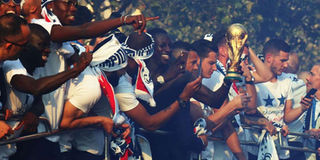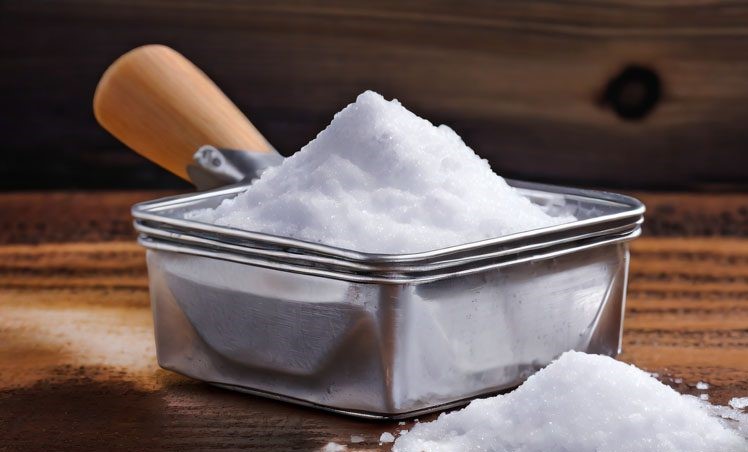Multi-racial French World champions draw praise, controversy

France's defender Benjamin Mendy (centre) takes a picture of the trophy as he celebrates with teammates on the roof of a bus while parading down the Champs-Elysee avenue in Paris, on July 16, 2018 after winning the Russia 2018 World Cup. PHOTO | ZAKARIA ABDELKAFI | AFP
What you need to know:
When France won their first World Cup in 1998 on home soil much was made of their "Black-Blanc-Beur" (black-white-Arab) multi-racial mix and, once again, Les Bleus' multi-cultural heritage has not gone unnoticed with their second triumph, this time in Russia.
Paris. Former US President Barack Obama chose celebrations to mark the centenary of Nelson Mandela's birth to laud the benefits of diversity by holding up France's World Cup success by way of example.
When France won their first World Cup in 1998 on home soil much was made of their "Black-Blanc-Beur" (black-white-Arab) multi-racial mix and, once again, Les Bleus' multi-cultural heritage has not gone unnoticed with their second triumph, this time in Russia.
Obama noted in Johannesburg that embracing diversity "delivers practical benefits since it ensures that a society can draw upon the energy and skills of all... people."
"And if you doubt that, just ask the French football team that just won the World Cup -- because not all these folks look like Gauls to me, they are French, they are French," he opined.
France's win over Croatia was the culmination of a campaign that saw coach Didier Deschamps, their skipper 20 years ago, draw on a phalanx of players of African heritage.
Of the 23 players in the French squad, 14 are of Arab or African descent including two of their final goalscorers -- Paul Pogba's parents hailing from Guinea while Kylian Mbappe's parents are Cameroonian and Algerian.
However, after the final won 4-2 by France, former Croatian star and coach Igor Stimac caused a storm with a now deleted post to Facebook which asked: "Who exactly are we playing against in the finals," referring to players of African descent in the French squad.
He then elaborated to Turkish news agency Anadolu that "we are facing the French Republic and the African continent," hence 11 opponents drawn from a continent of around a billion people whereas "we are four million."
- African origin -
The day after the final Italian daily Corriere della Sera said: "France (are) full of African champions mixed in with very good white players" who had beaten "a team only of whites (hailing from) the crossroads of three schools of football -- the German, the Slavic and the Italian."
Venezuelan President Nicolas Maduro saluted a "victory for Africa" and demanded an end to "racism towards African people in Europe."
In Africa itself, some observers labelled France the "sixth African team" at the World Cup.
An editorial Tuesday by pro-government Gabonese daily l'Union noted that "all French-speaking Africa celebrated the victory of Les Bleus as if it were its own in that the red, white and blue team owed it to its players of African origin.
"It is true they contributed but that would be to forget that these boys who are products of diversity are above all French."
Twenty years on from France's maiden triumph, which some politicians sought to show as a victory for racial integration in the country, "mentalities have evolved and, in spite of the difficulties which endure, the process of having populations of immigrant origin put down roots is continuing apace," says Yvan Gastaut, a specialist in the links between immigration and sport at the University of Nice Sophia-Antipolis.
- Values of the republic -
He praised French football authorities for aiding the process by "highlighting the values of the republic. More than integration, it is the notion of fraternity, lying at the heart of the republican motto, which stands out with this team," he concludes.
Benjamin Mendy, a French-born squad member with Senegalese roots, rejected the African label for the team. Seeing a tweet with flags of countries of origin beside the names of players with African roots, he replaced them all with French flags adding the word "fixed."
His compatriot, basketball star Nicolas Batum, commented for his part on social media that "yes, I have Cameroonian father and name but here we are all fighting and playing for France as we were born here and grew up here. We learned to play our sport in France and are proud to have French nationality. We win for France, for youngsters who watch us and aspire to be like us and hold high the French colours.
"Let's be proud of that. Vive la république et vive la France!"




